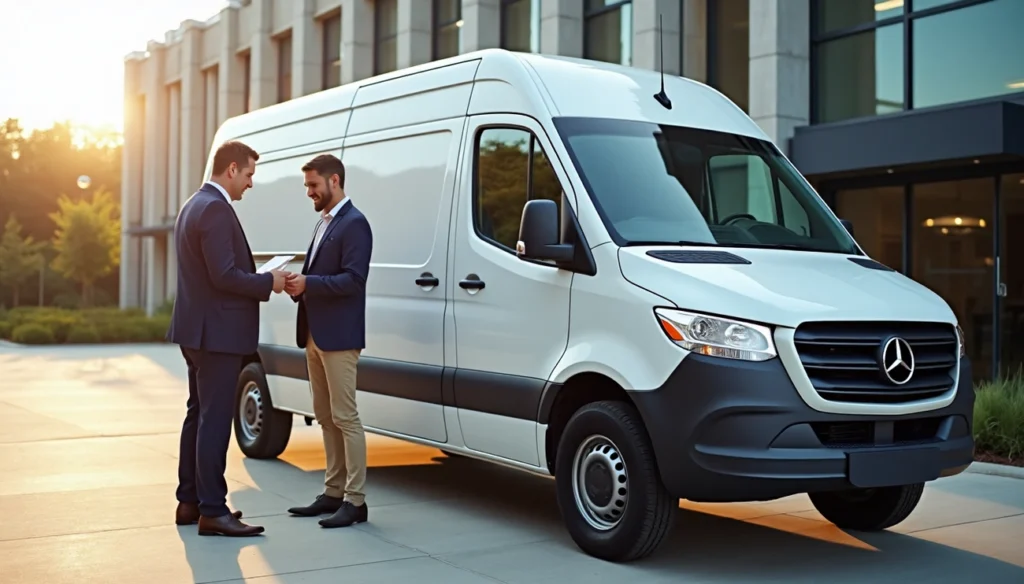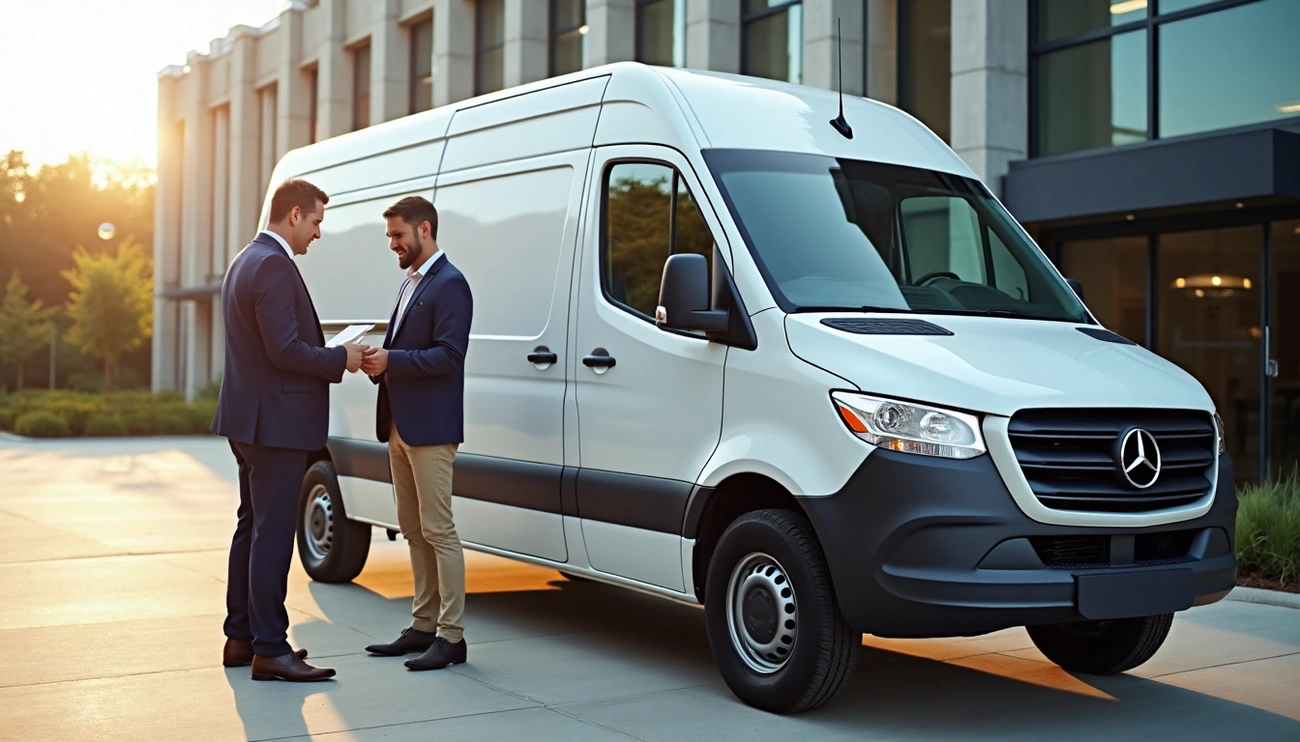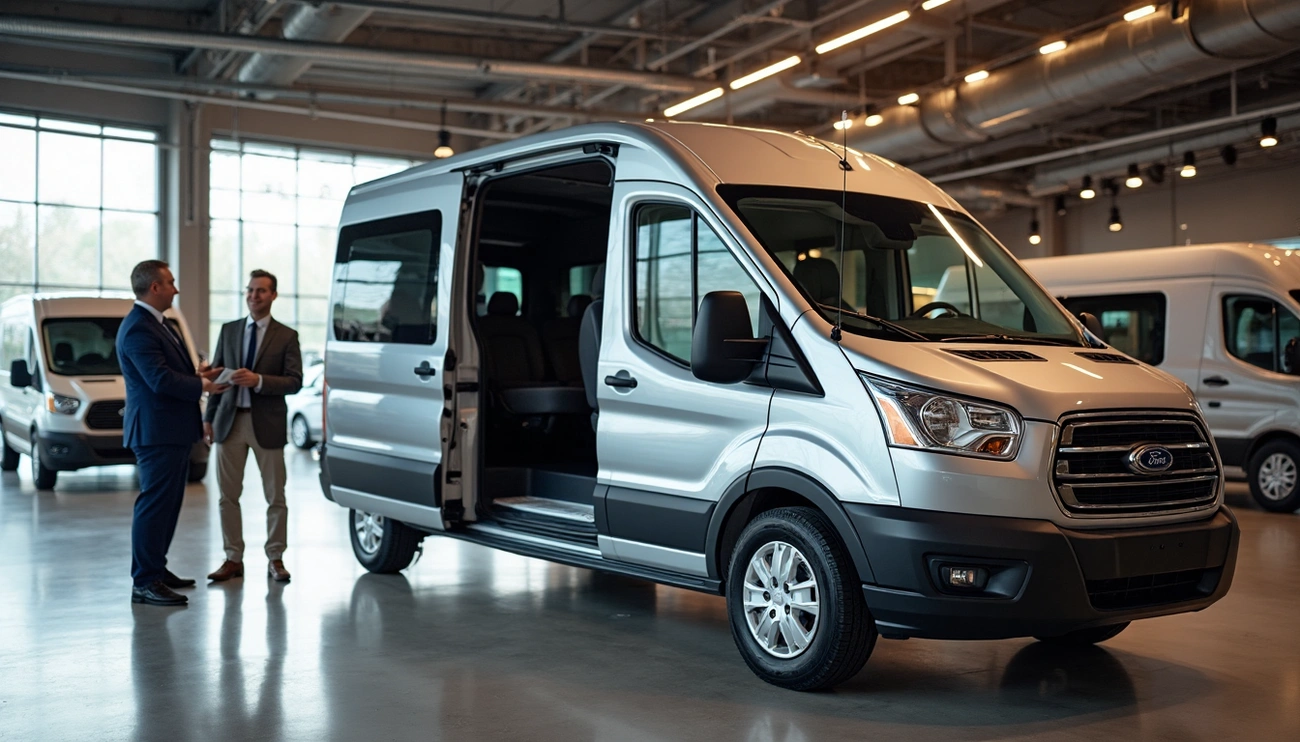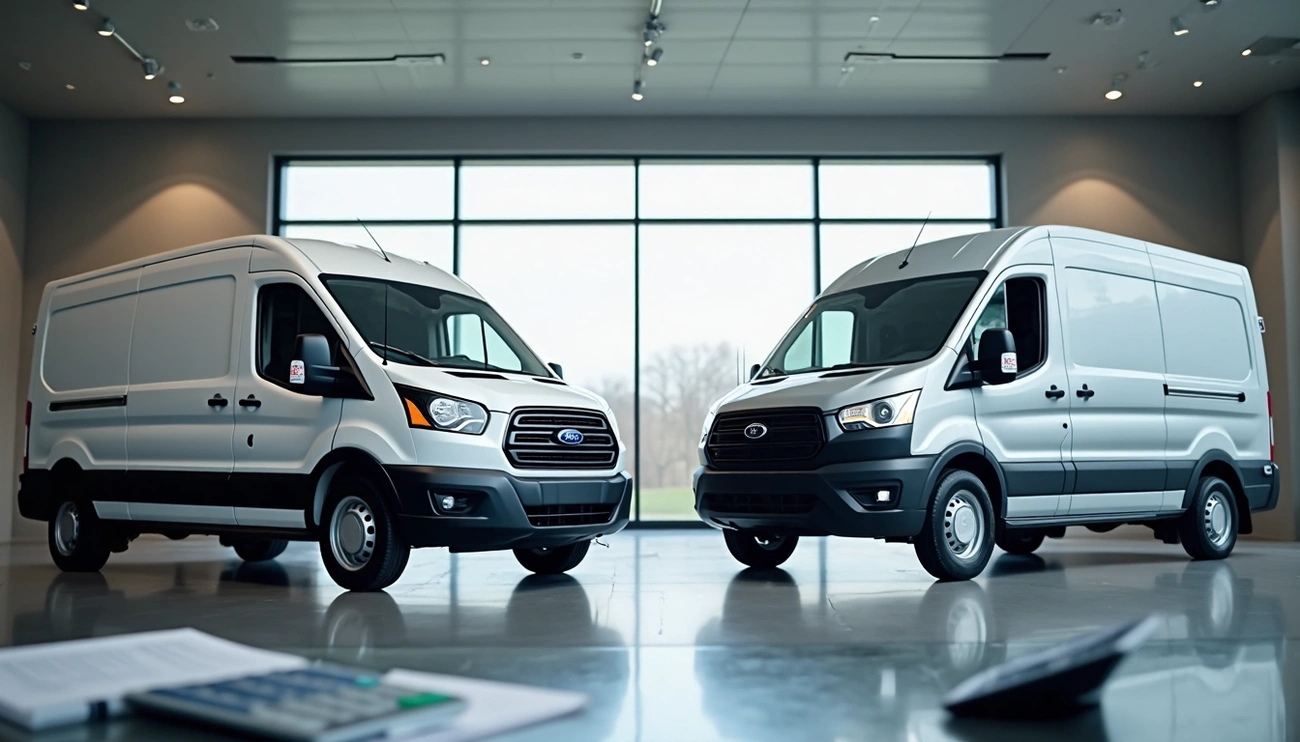Van Finance for new business
Van finance for new business can be a game-changer for new business owners just starting out. Many businesses need vans – from delivery services and construction to plumbing, electrical companies, landscaping, and mobile catering services. Source
Running a new business brings plenty of challenges, and transportation shouldn’t be one of them. The good news is that van finance doesn’t follow a ‘one size fits all’ approach. New businesses have several options to get a van without paying the full amount upfront. Van finance also offers great tax advantages – you can claim the interest paid as a business expense to reduce your tax liability. See self employed van finance

Your options of Van finance for new business become vital to understand if you run a limited company or startup with minimal financial history. The right choice depends on your business needs. You might want to look at Hire Purchase that lets you own the van eventually, or Contract Hire that provides budget-friendly options for sole traders and business owners. See business van finance
This piece will walk you through all van finance options available to your new company. You’ll learn how to boost your approval chances despite limited credit history and pick the solution that best matches your business’s growth plans. See electric van finance
Why Startups Need Van finance for new business
A Van finance for new business means much more than just a vehicle to startups and new ventures. This versatile asset can affect your growth and success in operations. You should know how this investment benefits your new business before you look into van finance options.
Operational benefits for new businesses
Your company’s capabilities will improve by a lot when you invest in a business van. These vehicles give you secure storage for goods, equipment, and tools, plus safe transportation between locations. Extra security features like deadlocks, alarms, and immobilizers come with many vans to protect your assets.
A Van finance for new business lets you expand your service capabilities. Some work needs specialized tools or heavy-duty machinery that won’t fit in standard vehicles. Your startup can offer more services once you get a van – services that weren’t possible before due to transportation limits. See van finance companies
Most people think vans are expensive, but they can be quite economical. A fully loaded van runs more efficiently than a loaded SUV because engineers designed it specifically for carrying capacity. These tough vehicles handle bad weather, rough treatment, and heavy loads well, making them an economical long-term investment as your business grows.
Brand visibility and mobile marketing
Business vans excel as moving advertisements. These convertible vehicles bring your brand right to customers’ neighborhoods, events, and daily routines. Each service call, supply run, or daily commute becomes a marketing chance.
Branded vehicles can catch thousands of eyes every day. A van’s large surface area gives you plenty of room for compelling messages that people can see from different angles. This mobile marketing works really well in UK urban areas, high streets, and busy roads.
A professionally branded van shows potential customers you’re stable and successful. It projects credibility and reliability, which builds your business’s reputation. Eye-catching van designs often start conversations that lead to immediate sales or future business referrals.
Common industries that rely on Van finance for new business
Many business sectors can’t operate without vans:
- Construction and trades: Construction businesses use vans the most to move materials, tools, and equipment to building sites. Plumbers, electricians, and contractors need the secure storage and mobility.
- Food and beverage: The food industry increasingly employs vans for everything from delivery to mobile catering. Some entrepreneurs turn vans into mobile kitchens, cafes, and restaurants—so they can serve customers in different locations while keeping costs down.
- Landscaping and gardening: These businesses move teams, plants, composts, and specialized equipment between client locations. The roomy interiors fit everything from small tools to larger machinery.
- Delivery and courier services: These businesses need vans to stay competitive and meet market needs.
- Mobile services: Pet groomers, beauty services, healthcare providers, and other mobile professionals use vans as traveling workspaces.
Startups can get these advantages without using up their capital by financing a van. This lets you put resources into other activities that drive growth while improving your operations and professional image.
Exploring Van Finance Options for Startups
Getting the right Van finance for new business for your startup means knowing about different finance options made for new businesses. Each option has its own benefits based on your ownership goals, cash flow, and future plans.
Hire Purchase (HP)
HP gives startups a clear path to van ownership. You pay an original deposit (as little as one monthly payment) and spread the rest equally over one to five years. The van becomes yours after you complete all payments and the option-to-purchase fee. You won’t face any mileage limits since you’ll own the vehicle. This works best for businesses that plan to keep their van long-term, especially if they drive lots of miles or need customization. The finance company keeps ownership until you make all payments.
Finance Lease (FL)
FL comes in two types—Full Pay Out and Balloon payment structures. This rental agreement lets startups share in sales proceeds when the agreement ends. Full Pay Out splits costs evenly across your term with no final balloon payment. The Balloon option gives you lower monthly payments by pushing some cost to the end. You can start a secondary rental period with yearly payments or sell the van for the finance company when it ends. FL makes sense if you want tax benefits without owning the van.
Contract Hire (CH)
CH works like a long-term rental where you give back the vehicle after the contract ends. Monthly costs run lower than ownership options, which helps startups watch their budget. You won’t worry about the van losing value or selling it later. Many deals include maintenance packages to avoid surprise costs. Businesses that want regular van upgrades without ownership duties love this option.
Personal Contract Purchase (PCP)
This option (also called Business Contract Purchase) Van PCP lets Van finance for new business choose between an original deposit, regular payments, and different end-of-agreement options. Your yearly mileage estimate helps set the van’s Guaranteed Future Value (GFV), which affects your monthly payments. The agreement ends with three choices: return the van, pay the GFV to keep it, or use any extra value toward another vehicle. Limited companies that want lower upfront costs with a chance to own later should consider this option.
Lease Purchase
Van Lease Purchase looks like HP but adds a final “balloon payment.” You make monthly payments throughout the agreement, then one bigger payment at the end to own the van. Most agreements run 2-5 years, but some stretch to 7 years in special cases. This works well for businesses that want ownership but need to spread out the cost. The balloon payment setup helps keep monthly costs down while you work toward ownership.
Short-term leasing for new businesses
Short-term van leasing starts at just 84 days and gives startups maximum flexibility for temporary needs. Project-based businesses, seasonal operations, or companies testing their vehicle needs find this perfect. You take less risk than with long-term deals and get your van faster than buying outright. Some companies offer month-to-month options, starting from just one month. New businesses unsure about demand or working with tight budgets can get the transportation they need without long-term money commitments.
How to Choose the Right Van Finance Option
Picking the right Van finance for new business option needs you to think over your business needs and future plans. Let’s look at what matters most when making this choice for your startup.
Do you want to own the van? Van finance for new business
Your business model should determine if ownership matters to you. Hire Purchase or Lease Purchase lets you own the van after you’ve paid everything off. As the owner, you can modify the vehicle any way you need without limits. Contract Hire works more like a long-term rental if you don’t want to own it. Finance Lease falls somewhere in the middle—you won’t own the van outright, but you might get some value from it once the contract ends.
How long will you use the van?
The time you plan to keep the van will affect your finance choice big time. Short-term leasing works best for needs under 12 months. You’ll pay more monthly but less upfront. Stable businesses that need regular transport should look at long-term leases (2-5 years). These come with lower monthly payments and better predictability. Breaking these contracts early can get pricey if your plans change suddenly.
Mileage and usage considerations
Each Van finance for new business option treats mileage differently. Hire Purchase is great for businesses that drive long distances since it doesn’t limit your mileage. Finance Lease, Contract Hire, and Personal Contract Purchase have mileage caps and charge extra for going over. Be realistic about your estimated mileage—this number helps funders set excess charges. Note that your total mileage spreads across the whole contract instead of yearly limits.
Budget and cash flow planning
Take a good look at your budget and cash flow before you commit. Monthly payments are just the start. You’ll need money for deposits (usually 10-25% of the van’s value), insurance, maintenance, servicing, road tax, and possible extra mileage charges. Contract Hire often builds maintenance costs into your monthly payments, which makes budgeting easier. Other options need separate funds for these costs.
Tax implications for limited companies
Tax benefits vary with each finance option. Finance Lease and Contract Hire payments usually count as tax-deductible business expenses. Hire Purchase and Personal Contract Purchase let you claim capital allowance on the van’s depreciation. The tax system sees vans as plant and machinery, which means they qualify for 100% allowances under the Annual Investment Allowance regime. This lets you deduct the full cost to lower your company’s taxable profits.
Application Process and Eligibility for Van Finance
New businesses face unique challenges when they apply for van finance because they lack trading history. Good preparation helps you direct this process toward success.
Documents required for new businesses
Finance companies usually ask for simple company information that includes business name, registration number, and annual turnover. Limited companies need to provide their directors’ details such as name, date of birth, and marital status. You’ll need these financial documents:
- Three months of business bank statements
- Management accounts (if available)
- A director’s guarantee (for limited companies)
- Business plan and financial projections
Understanding credit checks and scores
Credit checks play a vital role in every van finance application. Lenders review your creditworthiness through agencies like Experian, TransUnion, and Equifax. These agencies look at your payment history, credit history length, amount of credit owed, and types of credit you use. Lenders might check directors’ personal credit profiles for startups that lack financial history.
Using a guarantor or larger deposit
Van finance for new business can use several strategies to secure finance despite the challenges. A guarantor who covers payments if you default substantially strengthens your application. You could also offer a larger deposit to reduce the lender’s risk and show your commitment.
Working with a finance broker
Finance brokers understand which lenders welcome new businesses. They match your circumstances with suitable lenders and streamline the application process to boost your approval chances.
Tips to improve approval chances
Register on the electoral roll to verify your address details and improve your chances. Keep your address history consistent whenever possible. Your bank statements should look clean without unnecessary subscriptions. Limited companies must keep their Companies House records accurate and current. Your relevant industry experience from previous jobs will make your application stronger.
Managing Van Finance and Planning Ahead
Your van’s security is just the start—you need to manage your finance agreement and vehicle properly to succeed in business. Good financial management creates growth opportunities and helps build trust with lenders you might need later.
Making timely payments
Your van finance agreement requires you to stay on top of payments. Direct debits or payment reminders help you avoid late fees and protect your credit score. Regular payments help build good credit history that proves useful when you need more financing as your business grows. Van refinancing lets you pick deals that match your current finances better, with options for shorter or longer terms and interest-only payments.
Reviewing and refinancing options Van finance for new business
Smart business owners review their finance agreement terms, rates, and fees regularly. Interest rates change often, and they might have dropped since you got your van finance deal. Better rates through refinancing can lower your monthly payments, but remember that longer terms might cost more in total interest despite smaller monthly bills. Asset-backed loans usually have lower rates than other choices. One business freed up £160,000 to grow by refinancing their commercial vehicle fleet.
Maintaining your van to retain value
Well-kept Van finance for new business sell for more money and attract more buyers. Follow your manufacturer’s service schedule and fix mechanical problems quickly to keep your van’s value high. Regular cleaning stops rust and wear while keeping your van looking sharp. Financed vehicles need complete service records—good documentation of all services and repairs shows transparency and helps justify a better price when you sell or trade in.
Planning for future upgrades or fleet expansion
Smart planning about your transport needs helps sustainable growth. About 38% of UK fleet operators expect growth over the next three years, and 81% say company expansion drives this need. Another 39% believe company vehicles help attract and keep employees. Lease arrangements let you adjust your fleet as your business changes and upgrade vehicles regularly without spending too much upfront. Startups benefit from flexible finance options that let their fleet grow with their business, so transport never limits their company’s growth.
Conclusion Van finance for new business
Choosing the right van finance option is crucial for startups that need essential transportation without draining their capital. A business van does nowhere near just move things around – it boosts operational efficiency, shows off your brand, and creates marketing opportunities for new ventures.
Different business needs shape various financial pathways. Hire Purchase lets you own the van after you complete the payments. Contract Hire gives you flexibility without worrying about ownership. Finance Lease strikes a balance and might share profits when your agreement ends. Personal Contract Purchase and short-term leasing help businesses with special needs.
Several key factors should guide your final choice. Your business model’s need for van ownership comes first. The length of time you’ll need the van matters too – short-term leasing works for temporary needs, while longer agreements usually mean better monthly rates. You should be honest about your expected mileage to avoid surprise charges. Remember to include all costs in your budget, not just the monthly payment.
Startups can get good van finance deals even with limited trading history. Bigger deposits, guarantors, and working with specialized brokers substantially improve your chances of approval. A clean credit profile and current business documents make your application stronger.
Making payments on time builds your credibility with lenders, and regular maintenance keeps your van’s value high. Looking at your finance terms now and then might show ways to refinance that free up money for other business needs.
The right van finance solution gives your startup the ability to look professional, expand services, and focus money on growth instead of transport costs. Look at multiple options before you decide – the best solution changes based on what your business needs. Your van isn’t just transport – it’s an investment in your company’s future success.
Key Takeaways
Understanding van finance options empowers startups to acquire essential transportation without depleting capital reserves while gaining operational efficiency and mobile marketing opportunities.
• Multiple finance paths available: Choose from Hire Purchase for ownership, Contract Hire for flexibility, or Finance Lease for tax benefits based on your business needs.
• Ownership vs. flexibility trade-off: Hire Purchase offers eventual ownership with no mileage limits, while Contract Hire provides lower payments but requires vehicle return.
• Preparation improves approval odds: New businesses can secure finance through larger deposits, guarantors, clean credit profiles, and working with specialized brokers.
• Consider total costs beyond monthly payments: Factor in deposits, insurance, maintenance, mileage restrictions, and potential excess charges when budgeting.
• Strategic vehicle management builds future opportunities: Timely payments establish credit history while proper maintenance preserves value for refinancing or fleet expansion.
Van finance represents more than transportation—it’s a strategic investment that enables professional branding, expanded service capabilities, and sustainable business growth without immediate capital outlay.




